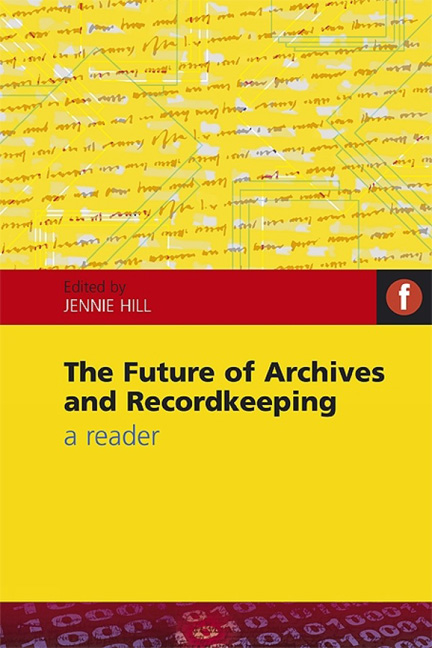Book contents
- Frontmatter
- Dedication
- Contents
- Acknowledgements
- Contributors
- Introduction: seeing the future of archives and recordkeeping
- Part 1 Defining archives
- Part 2 Shaping a discipline
- Part 3 Archive 20: archives in society
- Part 4 Archives in the information age: is there still a role for the archivist?
- 9 The postcustodial archive
- 10 Information management, records management, knowledge management: the place of archives in a digital age
- 11 Appraisal and the future of archives in the digital era
- Index
- Miscellaneous Endmatter
- Miscellaneous Endmatter
- Miscellaneous Endmatter
11 - Appraisal and the future of archives in the digital era
from Part 4 - Archives in the information age: is there still a role for the archivist?
Published online by Cambridge University Press: 08 June 2018
- Frontmatter
- Dedication
- Contents
- Acknowledgements
- Contributors
- Introduction: seeing the future of archives and recordkeeping
- Part 1 Defining archives
- Part 2 Shaping a discipline
- Part 3 Archive 20: archives in society
- Part 4 Archives in the information age: is there still a role for the archivist?
- 9 The postcustodial archive
- 10 Information management, records management, knowledge management: the place of archives in a digital age
- 11 Appraisal and the future of archives in the digital era
- Index
- Miscellaneous Endmatter
- Miscellaneous Endmatter
- Miscellaneous Endmatter
Summary
Introduction
It is risky to predict the future, especially in the volatile information professions, but it is always fun to try. Some make wild predictions with the assurance that they won't be around to be held accountable for them. David Friedman (2008, 4) states that the ‘future is radically uncertain’, basing this on what is presently happening with intellectual property, personal privacy, transparency and its mixed blessings, e-business, open space and scholarship, computer crime, biotechnology and virtual reality – all issues with implications for what archivists do, especially the critical aspect of their work as appraisers and documenters. Archival appraisal is also the task that might seem to be completely contrary to where we are heading in the digital era, as some predict that a hallmark of our future may be a new ability to save everything (ending any need for selection).
This chapter examines three key areas. First, it characterizes how information technologies are transforming our world. Second, a brief case is made for why appraisal is the central and most important archival function. Third, it relates the new digital technologies to archival appraisal (and vice versa), making a case for how more rigorous archival appraisal must become, and speculating about the archivist of the future.
The world flashes by
The world of the archivist has changed substantially in the past generation. The world of archives has changed significantly in the last 40 years when there were no computers, queries were answered by telephone and postal mail, reference services were provided during certain hours on specific days, finding aids were only available in printed form, and archivists dealt mostly with paper-based materials. Today, the typical archivist stares at a computer screen most of the day, provides answers to queries via e-mail, answers reference questions on an almost 24/7 basis, distributes finding aids on the world wide web, and works with an increasing array of digitally born documentary materials. The archival universe is populated with Blackberries, iPods, cell phones, GPS (global positioning system) navigation systems, Flickr, blogs, MySpace, wikis, flash mobs, open source software, digital cameras, GPS trackers, YouTube, and Facebook (just for starters).
- Type
- Chapter
- Information
- The Future of Archives and RecordkeepingA reader, pp. 217 - 242Publisher: FacetPrint publication year: 2010
- 1
- Cited by



